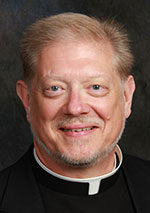That All May Be One / Fr. Rick Ginther
Take time to appreciate the faith and goodness in the stranger
 (Following are musings based on reflections offered at the National Workshop on Christian Unity 2021 by Benedictine Father William Skudlarek.)
(Following are musings based on reflections offered at the National Workshop on Christian Unity 2021 by Benedictine Father William Skudlarek.)
The Benedictine monks of Saint Meinrad Archabbey trained me. Based on the Rule of St. Benedict, they instilled in me a sense of “hospitality”: “Let all guests who arrive be treated as Christ” (53:1).
Taking note of one’s own feelings of being “other” helped to connect to the guest. Additionally, Jesus’ teaching, “Do unto others as you would have them do unto you” (Mt 7:12; Lk 6:31), was an inspiring touchstone.
Who is the guest? Our first thought might be someone whom we know. On second thought, however, that does not seem to be the focus of the sixth-century monk, St. Benedict.
Monasteries in his time, and still today, are places of rest for many, mostly strangers.
In the Book of Exodus, Moses said: Remember, we were strangers so welcome the stranger. (Ex 22:20)
Jesus told the story of the Samaritan who showed neighborliness. Two strangers—one Jew, one Samaritan—one welcomed, one welcoming, because of human need.
In the Gospel of Matthew, chapter 25, one who welcomes the stranger is the one judged righteous, that is, walking in the way of God.
This backdrop of monastic and biblical hospitality is rooted in two Greek words: philos and xenos. Literally—love of the stranger.
This is “upside down” teaching. One is not to just love your family, kin, clan. One is to love the stranger.
Abraham, the father of the Jewish, Christian and Muslim faiths, is the oldest root in the tree of hospitality, God being the taproot.
In Genesis 18, Abraham sits at his tent and encounters the divine spirit. When he opens his eyes, he encounters three strangers, foreigners. They were pagans, people with differing beliefs and strange ways. Yet, in them, Abraham sensed messengers of God (angels).
Abraham embraced these foreigners with faith and hospitality, Clement of Rome wrote in his letter to the Corinthians in 96 A.D. The three are saved by the hospitality of God (for God sent them). Thus, they were welcome guests.
Recently, someone asked why a Catholic Christian would want to visit the Jain temple. (See my invitation to do so in last month’s column.) Why, I was asked, would the questioner want to be among heathens?
I was shocked.
Welcoming the stranger—indeed, allowing oneself to be welcomed as the stranger (the disciples sent on mission)—is at the very root of Christian identity. God in Christ invites everyone with the gift of life and salvation. (Jn 3:16)
Why learn about another religion from a member of that religion? Why learn from a non-Catholic Christian?
Learning what they believe, how they express that in prayer, how they live it in their daily life, how they express it in art and architecture, how they find hope and good will springing forth—that is why!
Welcome the stranger! Welcome the “other”! Because to some, you are the “other.”
Love the stranger as you would love yourself.
To love the other requires getting to know the other.
This is the root of “dialogue” on any level. But it is especially true for a lay person. Each one of us may “dialogue.” Learn. Listen. Appreciate the faith and goodness in the stranger.
Be heard. Speak. Allow the other to appreciate the faith and goodness in yourself.
“Let all guests [strangers, the other] who arrive be treated as Christ” (53:1). That phrase is a Benedictine mandate rooted in biblical revelation and Christ’s command.
It is a mandate to embrace, to live, to celebrate. Strange, but necessary.
(Father Rick Ginther is director of the archdiocesan Office of Ecumenism and Interreligious Affairs. He is also the pastor of Our Lady of Lourdes Parish, Indianapolis.) †
 (Following are musings based on reflections offered at the National Workshop on Christian Unity 2021 by Benedictine Father William Skudlarek.)
(Following are musings based on reflections offered at the National Workshop on Christian Unity 2021 by Benedictine Father William Skudlarek.)